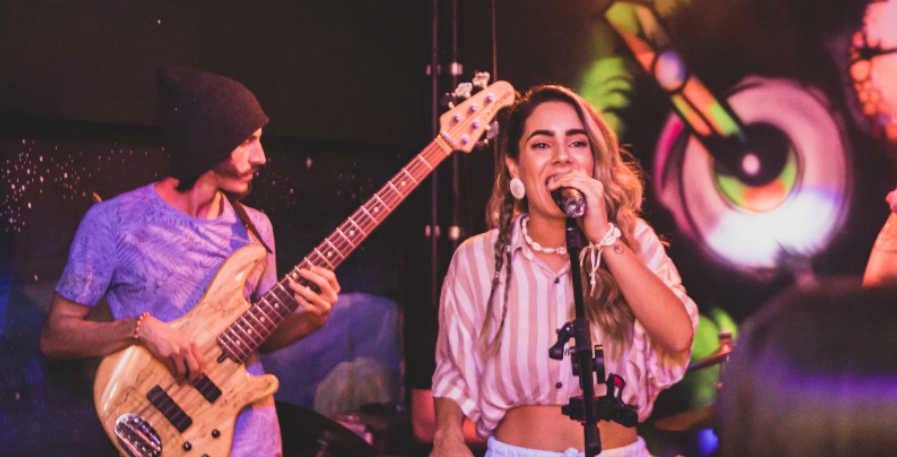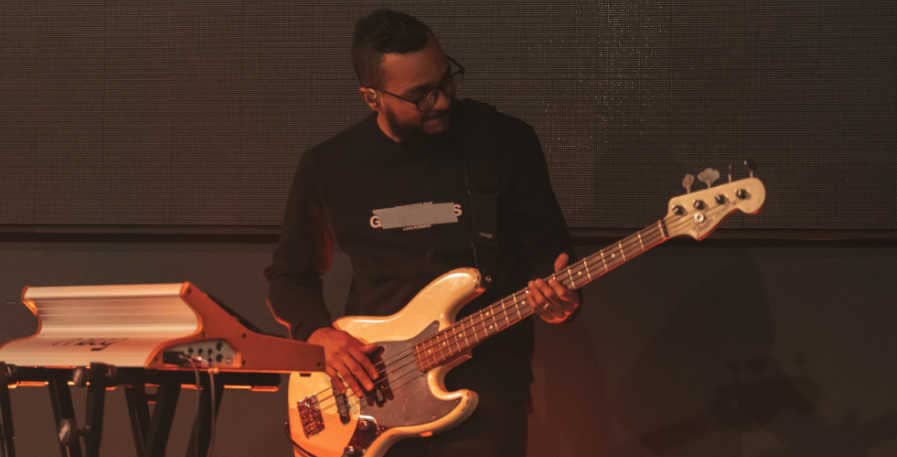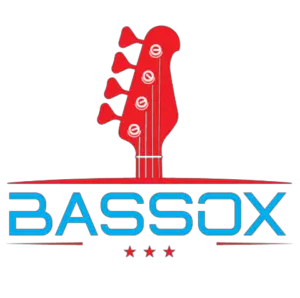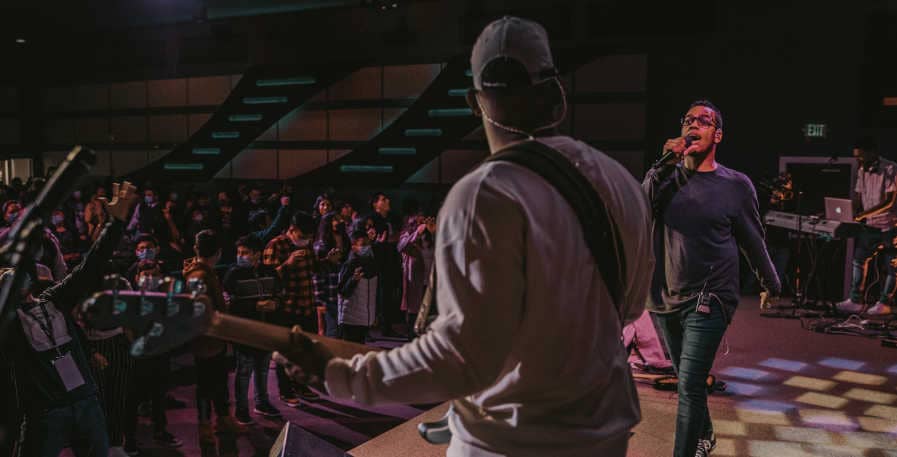Playing hip-hop bass lines is one of the most satisfying things one can do on a bass guitar.
It`s a genre with a lot of versatility and with that comes a lot of opportunities to express yourself through your instrument. Hip-hop is also heavily centered around the beat of the song. Thus, the best hip-hop basslines tend to be an integral and memorable part of the song.
Because of this, I decided to write this guide to teach you all you need to know about playing bass in hip-hop.
I will show you why the instrument is so integral to the genre and what this means for you as a bassist. You will also learn some common techniques hip-hop bassists use. Lastly, I will give some intermediate tips for how to articulate your notes to make you sound even more dynamic and groovy.
Why is bass important in hip-hop?
In hip-hop, the bass generally provides a groovy and simplistic rhythm that works together with the drums to create a beat. The bass is thus important in hip-hop because the genre would lack it`s typical rhythmic and harmonic foundation without it.
The Sugarhill Gang`s “Rapper`s Delight” is considered one of the first commercial releases by a hip-hop group. It features an incredibly groovy sample of Chic`s “Good Times” for the bass line.
Thus, while modern hip-hop sounds vastly different than The Sugarhill Gang, their influence is undeniable. No wonder then that hip-hop bass is so groovy, as this line is sampled directly from a funk/disco group.
A great example of this influence can be seen in Kanye West`s 2010 song “Hell of a life”. (this song contains explicit lyrics)
Kanye`s flow is vastly different from that of The Sugarhill Gang. The song is relatively progressive for a hip-hop song and it even features a melodic chorus.
The song also mainly uses electronic instruments. Furthermore, the vocals are heavily distorted in several parts of the song, which gives the song a futuristic feel.
Despite all this, the role of the bass is the same as it was in Rapper`s Delight 40 years prior. It`s funky, but it fundamentally works as a backdrop with the drums to make the vocals shine.
Similar to most genres, the bass tends to work best in hip-hop when it is not at the forefront. Still, If you were to remove the bass from any of the 2 songs above they would lose their groove and drive and would end up sounding sound hollow. That`s why the bass is not only important in hip-hop; it is essential.
How do you play hip-hop on bass?
Generally, hip-hop bassists pay close attention to the drummer when playing bass lines. This is so that they can play grooves that provide a meaningful rhythm to the song, and that provide accenting at the same time as the kick drum.
What separates the bass in hip-hop from many other genres is that grooves rely heavily on pauses and sustained notes.
As a bass player, you want to be mindful of these genre staples. If you were to play straight 8th notes on a hip-hop song, it would make the beat sound more like rock n` roll. You could solve this by playing sustained whole notes. However, you would still lack a lot of the groove and rhythm that make up most hip-hop beats.
Therefore, it is best to aim for something in between. Great hip-hop bass lines tend to be simple but effective. They generally achieve this by having some sustained notes, some pauses, and some faster notes. In other words: Don`t play any more notes than you have to, but make every note count.
Hip-hop bass lines also don`t tend to rely heavily on variation. It`s not uncommon for the same bass line to be repeated for the entirety of a song.
This is not to say that you can`t add fills and change things up. Mixing things up can make a hip-hop song more dynamic and interesting, and I always like to add small details here and there.
What this means is that variations and bass fills should never be your main focus. If they come at the expense of the groove or your bass line starts to sound over the top and intrusive, it`s much better to keep things simple. Add extra details and variation if you find good spots for it, but never be afraid of keeping it simple.

Essential skills for hip-hop bassists
To do well as a hip-hop bassist there are some essential skills you need to master. Here are 3 of the most important ones:
1. Ghost notes
Ghost notes are an amazing way to add more groove and emotion to your bass lines.
A ghost note is a muted note, that provides a rhythm but no harmony. While ghost notes have many uses, they will generally make a line more funky and groovy when utilized well.
Given that basslines get repeated a lot in hip-hop, adding some ghost notes can thus have a major impact on the song as a whole.
2. Switch up the tone
Different forms of hip-hop require vastly different bass sounds.
A smooth and clear bass tone fits most forms of old-school hip-hop. A good bit of modern hip-hop has more of an electronic sound and utilizes a synthesizer for the bass.
Because of this, it is important that you are able to switch up your tone. You will be able to cover some forms of hip-hop with just EQ. Other forms might require you to play with a fuzz or distortion pedal.
Becoming familiar with all the ways your bass can sound will thus make you more adaptive and versatile within the genre.
3. Syncopation
It`s common for hip-hop bass lines to be partially syncopated.
For example, the first note of a bar might align with the first bass drum hit, while the following notes accentuate the backbeat. This makes grooves feel more alive and make them easier to move to.
Thus, when playing hip-hop, aim to accentuate your grooves in places that seem unintuitive at first.



Articulation for hip-hop bassists
Intermediate players should focus on how they articulate and accentuate their notes when playing hip-hop. This means that they will play individual notes stronger or weaker than other notes.
There are often several spots in hip-hop bass lines where this will make sense to do. Here are 3 good spots to change up your articulation:
1. On the first note of a bar
A good bit of modern hip-hop features a heavy bass sound. These bass lines tend to be simplistic and rely heavily on sustained notes.
For lines like these, it can make sense to use some extra strength when accenting the first note of the bassline.
2. At the same time as the kick drum
Hip-hop drums tend to feature one or more kick drum hits that stick out.
These are generally 8th or 16th notes that would sound out of place in a straight kick-snare-kick-snare groove.
As a hip-hop bassist you want to be playing along with the kick drum, and accenting these spots can often make sense. These notes can work well when played either weaker or stronger than you normally would.
3. At the same time as a rhyme
The rhymes are generally written for the beat, and not vice versa.
However, if a rhyme is rapped at the same time as a bass note is played, this can be a great spot to add some extra power to it.
I advise against doing this all the time as it can quickly become too much though. A good way to do this is to do it articulate the best rhymes in a a song. This adds more punch to them, and can thus make them sound more impactful.
Conclusion
Playing hip-hop as a bassist is a lot more demanding than it might seem at first. While basslines are generally not that technically demanding, it takes precision and feel to play them well.
It also takes knowledge and a good ear to write good hip-hop basslines. There are endless ways to go about it and it takes experience to understand what type of basslines is most fit for any individual song.
My best advice is to focus on tips outlined in the article and to listen to a lot of different hip-hop. Listen to the smooth lines in legendary acts like The Roots and A Tribe Called Quest. Then dive into the driving electronic bass lines of Kanye West or Big K.R.I.T. Check out Anderson Paak or Little Brother for acts that combine old and new into a modern bass sound.
This will give you lots of great ideas for how to write and play your own hip-hop basslines. In addition to that: keep your lines groovy and syncopated, lock in with the drums, and don`t be afraid to experiment. If you can do that, you will be well on your way to becoming a great hip-hop bassist in no time.
A lot of hip-hop acts don`t have a bass player. But this doesn`t have to mean that the bass guitar is redundant for the genre. To learn more, continue by reading about whether bassists are necessary.

